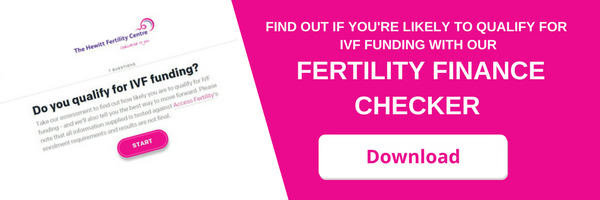
People all over the world find themselves turning to IVF treatment to help them have a child.
It’s actually quite common for the first IVF cycle to fail and patients often choose to continue to pay for treatment privately until they fall pregnant.
Three cycles reportedly have a cumulative effect and increase the chances of pregnancy by around 45-53%. If you’re worried about whether you should begin another cycle or other complications, read on because unsuccessful IVF treatment on the NHS doesn’t mean you should give up all hope.
How does IVF treatment work?
For those who are unsure what happens during IVF treatment, there are 6 core stages described by the NHS:
- Suppressing your natural cycle using medication.
- Boosting your egg supply by using medication to push the ovaries into producing more eggs.
- An ultrasound scan used to track progress and medication used to help mature the eggs.
- Collection of eggs using a needle which is inserted into the ovaries via the vagina.
- Fertilising the eggs by mixing them with sperm and leaving them for a few days.
- Transferring 1 or 2 embryos into the womb.
When the IVF treatment is unsuccessful...
If you find out the treatment has been unsuccessful, you’ll probably wonder “what next?” You might feel a lot of emotion and it’s not unusual to feel you’re to blame. You are not to blame. Try not to take any pain out on your relationship - your partner is going through this with you and needs your support as much as you need theirs. Focus on the future. Don’t delay your follow up appointment because it’s often reassuring to know what went wrong and learn whether there is something you can do differently on the next attempt.
Why has IVF been unsuccessful?
The most common cause of unsuccessful IVF treatment is that the embryo(s) stop growing before they can implant. Another possible factor could be the uterine receptivity, but the majority of unsuccessful IVF is attributed to embryo quality. Embryos are assigned grades based on their rate of development and some more subjective factors such as symmetry of cells and degree of fragmentation. Embryos with high-quality grades are much more likely to implant than those with low-quality grades. Other components of successful IVF treatment include sperm quality, but the quality of eggs is the most important as it’s the responsibility of the egg to ensure a normal chromosomal structure in the embryo.
Shall we try again?
If you do choose to start a second course of IVF treatment, take it slow and steady. Don’t rush into anything. Give yourself as much time as you and your partner need after your first attempt and then make an appointment with your fertility doctor to talk about the next steps. If you are worried about being able to afford IVF treatment privately, there is financial support available. This can include being able to pay in instalments, paying a fixed price for multiple cycles or accessing a specialist loan, some of which have protections built in to .
Has your IVF treatment been unsuccessful? Worried about the cost of going private? Try our Fertility Finance Checker to see if you qualify for a little help.





